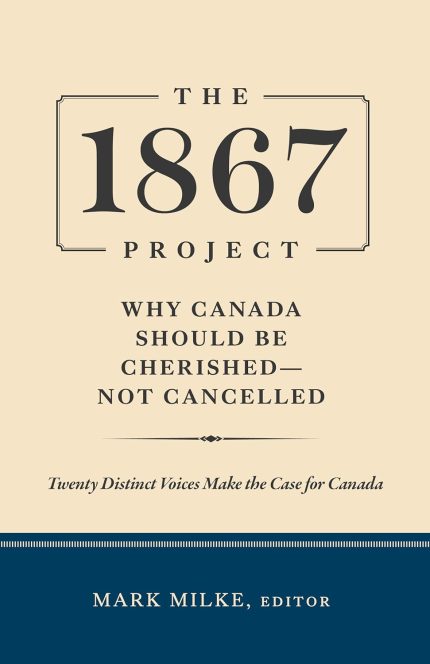The Frontier Centre for Public Policy held an informal symposium reviewing an important Canadian book—The 1867 Project: Why Canada Should be Cherished, Not Cancelled: Twenty Distinct Voices Make the Case for Canada (Calgary, AB: The Aristotle Foundation for Public Policy, 2023, 320 pgs., $25.00). The book is edited by Mark Milke, President of the newly formed independent think tank – The Aristotle Foundation for Public Policy. Writers associated with the Frontier Centre share their thoughts on this book in a symposium of three reviews. Not surprisingly, they do not always agree.
Read the other reviews of The 1867 Project by Rodney Clifton & Sophia Leis and Gerry Bowler.
Let me begin by saying that I recommend highly this book of 20 essays from the new Aristotle think-tank. Mark Milke is the president of the think tank and the editor of this book. Some of the chapters, on their own, justify the book. An immediate question, though, is what specifically we should cherish about Canada and why. Much of the book comprises an assault on the misconceptions of wokedom, and then sets those misconceptions aright. Several chapters rehabilitate the reputation of historic figures now vilified in the causes of political correctness and ethnicity-based inventions. Accordingly, this book alone could serve Canadians as the antidote for many of the misconceptions of our time.
The standing of Canada’s first Prime Minister Sir John A. Macdonald has come to the fore because of the allegation that he was the instigator of the much-maligned indigenous residential schools and thus of some kind of genocide. This has led to the widespread movement to remove statues of him and to change the name of institutions named after him. As Greg Piasetzki points out, there were Indian residential schools from 1695, more than a century before Sir John was born in 1815. And it’s a well-kept secret, not even mentioned by Mr. Piasetzki, that there’s the apparently flourishing Southeast Collegiate in Winnipeg, a residential school founded by Manitoba’s Indian bands in 1995, and staffed by Indians.
Mr. Piasetzki has it right that Sir John founded the forerunners of the RCMP in 1873, and thereby saved prairie Indians from the wars and slaughters that occurred south of the border. He quotes a grateful Blackfoot Chief Isapo-Moxika (Crowfoot): “If left to ourselves we are gone. The whiskey brought among us by the Traders is fast killing us off ….”
I believe that with the wisdom of hindsight Sir John might have averted the short-lived 1885 Rebellion. I also believe that it was a mistake to make of Louis Riel a martyr by not commuting his execution. These wrinkles are insignificant, however. Yes, Canadians should cherish the memory of this great man.
The chapter on Edward Cornwallis, founder of the city of Halifax, by Leo J. Deveau, is one of my favourites. Mr. Deveau captures the idiocy of cancel culture with piercing perspicacity and a delightful turn of phrase.
Although in a way off topic, Marjorie Gann’s essay notes, correctly, that the British were the first, over two centuries ago, with their initiatives to end slavery. She quotes Douglas Murray at the forefront of her essay. He wrote: “The British paid a hefty price for the abolition of the slave trade for almost half a century … British taxpayers spent almost half as much suppressing the slave trade for forty-seven years as the country profited from it in the half century before it was abolished.”
Promoting the case for core knowledge, Ms. Gann says this: “Rather than a history of western guilt, students deserve a more comprehensive history. Learning about world slavery offers an education with breadth and depth, posing questions within many disciplines.”
Ms. Gann cites the indoctrination in Critical Race Theory promoted in Ontario’s schools, starting in Grade 1. A lesson for Grades 4-6 is designed to show how “the ongoing process of colonization has resulted in the under-representation of First Nations, Métis, and Inuit at all levels of government.” The fact is that in a chamber of 105 senators, 24 Indigenous senators represent less than 2 percent of their proportion in the population. They are vastly overrepresented in the Canadian senate.
The essay by Joseph Quesnel is very optimistic, with its heading “Indigenous peoples have a chance—if they grasp it.” clearly, Indigenous oligarchs already have chances other Canadians can only dream of having. In our age of affirmative action and downside-up preferences, many Indigenous people prosper mightily, many of them far beyond any corresponding competence. Reality is there’s an all-but-unemployable and multi-generational underclass in remote settlements and urban slums. Many who lack even half-way reasonable education and skills training have no way to grasp the opportunities Mr. Quesnel suggests are open to them. Ostensible leaders profit from the iconography of deprivation, which they don’t want to disturb.
I am on a different page when it comes to the books rosy view of immigration. While it’s true that immigration partly enabled the emergence of Canada as a great country, this issue needs evaluation today in the context of the needs of the labour market, housing, health care, and crime. How do we reconcile massive immigration with delivering bare subsistence in perpetuity to perpetually unemployed welfare-recipients? Who doesn’t know that the entry-level job for many immigrants awaiting a work permit is selling drugs—and for some a career in the underground economy?
I had hoped Bruce Pardy would touch on the need to bring Canada’s justice system in line with the needs of common people as well as the high-tech economy. This book could also have used chapters addressing declining business investment, the economic and political imbalances between regions, and Canada’s deteriorating international standing. Cherishing Canada in future could actually be more challenging than this book suggests.
Colin Alexander was publisher of the Yellowknife News of the North.


